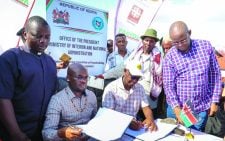Good news to students eyeing university slots

Thousands of students seeking to join universities next year got a reprieve, after the government lowered the minimum qualifications for some courses.
Those joining universities in next year’s intake will also be allowed to pick alternative subjects in order to meet the minimum requirements for certain degree courses.
Biggest beneficiaries in the new guidelines are students seeking to pursue Bachelor’s degree courses in education, agriculture, fashion and design among others.
The changes will see the minimum grades for Mathematics lowered for some courses or the requirement for Biology or English substituted with Agriculture or Kiswahili respectively.
New measures
The new rules will take effect in the next university and college admissions for students, who will sit the Kenya Certificate of Secondary Education (KCSE) examination in March 2022.
Kenya Universities and Colleges Central Placement Service (Kuccps) Chief Executive Officer Mercy Wahome yesterday said the changes will ensure equitable, fair and effective placement for all those who qualify to join universities.
“We have subjects like Agriculture. Currently, to do a Bachelor of Science in Agriculture, the main subject requirement is Biology yet we have students who have taken agriculture from Form One to Form Four and this subject does not count in their admission to university,” said Wahome.
“The criteria will recognise such subjects like Agriculture. While Biology remains, we also recognise that you have studied Agriculture and that is also taken into account when considering qualifications for admission,” she explained.
She made the remarks at Kenyatta University during Kuccps stakeholder forum for validation of placement criteria for degree programmes, presided over by University Education Principal Secretary (PS) Simon Nabukwesi.
Wahome also explained that henceforth, Home Science will be recognised as one of the subjects to be considered for students seeking to pursue a degree course in fashion and design.
She said the new measures will help students to take courses they like at the university, in line with the spirit of the Competency Based Curriculum (CBC).
The new changes will see Kiswahili accepted as an alternative for English for students seeking to pursue a Bachelor of Education (Science) degree programme.
The changes will also see Mathematics removed as a minimum subject requirement for students seeking to pursue a Bachelor of Education (Arts) degree programme.
For students seeking to pursue degree programmes in Agribusiness and Agricultural Economics, the minimum requirements for C+ (plus) for Biology will be lowered to C Plain while a C+ (plus) in Agriculture and Business Studies will be accepted as an alternative to Biology.
She said the new measures had been developed following recommendations from universities and professional bodies.
Wahome said this is an opportunity for them to agree on minimum subject requirements, which had a discrepancy at some point and if not looked at would cause a problem.
“When looking at criteria for placement, we have professional and exam bodies as well as the training institutions that come in to advise,” said Wahome.
For Medicine, Surgery and Dental Surgery as well as Engineering and Architecture and Architectural studies respectively, proposals are that the minimum subject requirements be maintained and still remain regulated programmes.
There are also proposals to introduce English or Kiswahili capped at C (Plain) in Computer Science, Computer Technology as well as Mathematics and Computer Science.
Course cluster
For Bachelor of Sciences (BSC), there are proposals to introduce Biology or Physics or Chemistry capped at C plain.
Nabukwesi said the review of degree placement criteria will apply to students who will sit their Kenya Certificate of Secondary Education (KCSE) in March and subsequently join universities in September.
“The review was based on circumstances and dynamics of life since there are new courses that have been introduced, more space, higher population of students passing to join universities and placement of students to private universities,” Ps said the PS.
He added: “We need to relook at qualification criteria so that we provide for access, equity and opportunity for everybody. We are looking at sensitisation of students so that they make choices based on talents and capacities.”
He said the review will involve looking at every course cluster requirements so that the country can have the best going forward.
“We must be keen to do the very finest in terms of what will satisfy the interests of everybody and also fair to all. We are first reviewing universities and then colleges will follow later,” Nabukwesi stated.
He called for the need to identify talent in a student and lead them to choose what fits best so that they can get the right training to contribute to the development of humanity.
He said there are proposals to make it compulsory for schools to issue career booklets and sensitise children to know what exists in career development for informed choices.
The process of review started in 2019 when Kuccps requested universities, professional and regulatory bodies to submit their views on the minimum requirements for courses.











